Apple 15-inch MacBook Pro (Late 2011) Review
by Anand Lal Shimpi on November 17, 2011 5:10 PM EST- Posted in
- Mac
- Apple
- Intel
- MacBook Pro
- Sandy Bridge
- Laptops
Display Quality
The display hasn't changed since earlier this year, although this is the first 15-inch 2011 MacBook Pro that I've tested with the standard resolution (1440 x 900), glossy panel. Aesthetically I prefer this panel (I'm the rare case that isn't bothered by gloss) and the lower resolution is easier on my eyes, but for productivity I do feel the 1680 x 1050 upgrade is worth it. If this is going to be a workhorse, and you have good eyesight, get the high-res version.
As always, Apple calibrates its panels at the factory. Note the out-of-the-box white point across the 11-inch MacBook Air, 13-inch MacBook Air and 15-inch MacBook Pro:
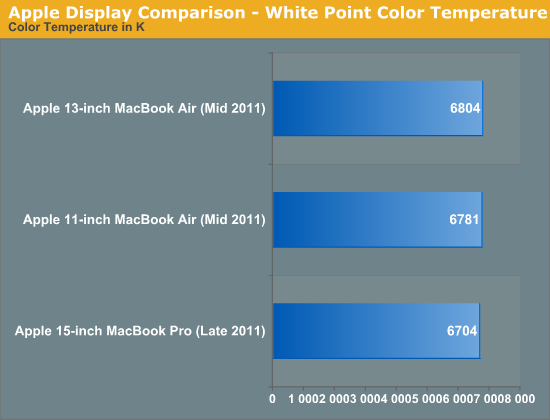
Apple wants to deliver as consistent of an experience as possible across its product line. While the Air models still don't have quite as high quality a panel as the Pro, at least there aren't any wide variations in what constitutes white on these panels.
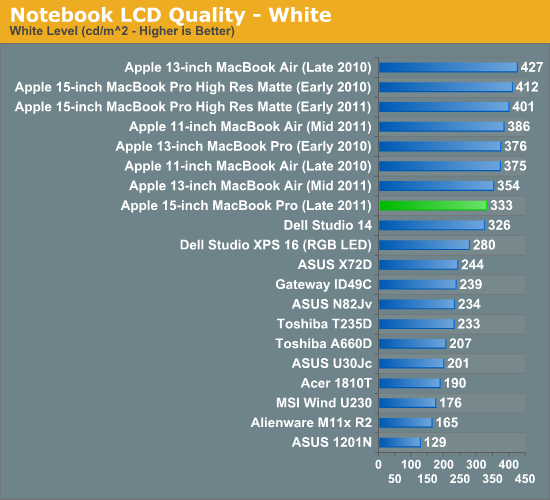
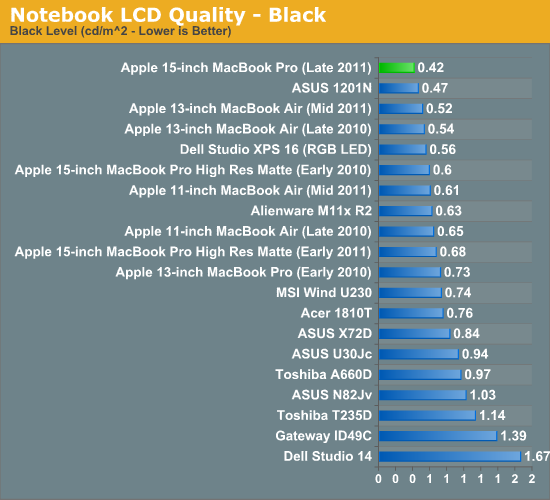
Brightness is down a bit compared to the high-res panel we looked at earlier this year, but so are black levels. The combination of the two actually results in a slightly higher contrast ratio than what we measured on the early 2011 models. In practice the panel looks just as good and seems to get just as blindingly bright as my personal 15-inch.
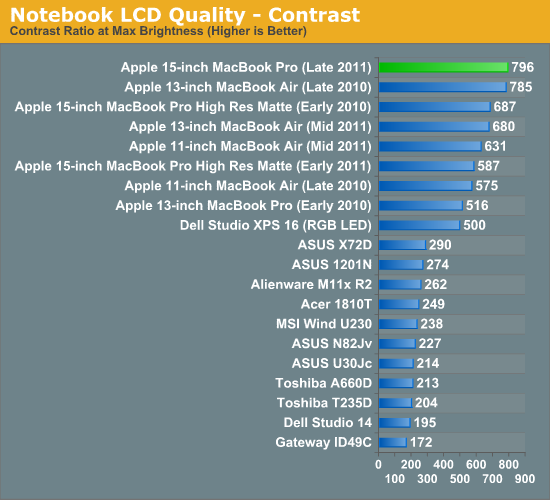
Color quality and gamut are virtually identical as well, no surprises here:
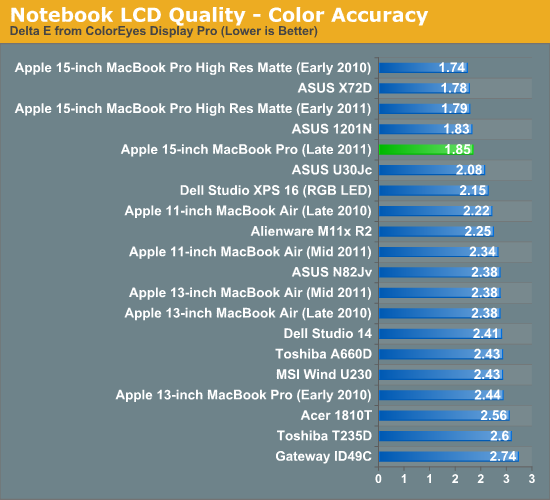
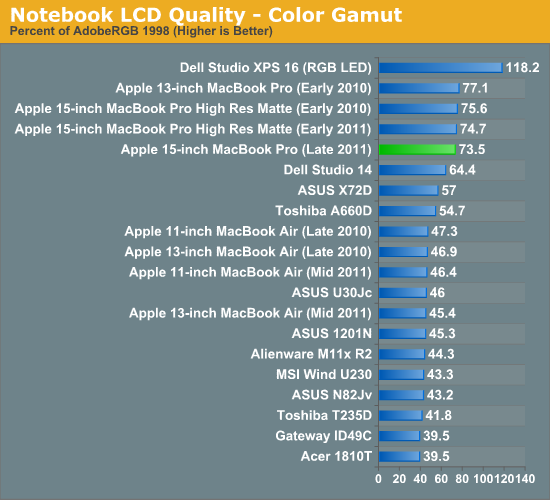
Hard Drive
The more traditional Macs (MBP, Mac Pro, iMac) continue to ship with mechanical hard drives by default, the late 2011 update is no different. My review sample came with a 5400RPM Toshiba MK5064GSXF. The drive features two 320GB platters (obviously not all in use for the 500GB capacity), and an 8MB cache.
All of my personal systems use SSDs and in testing the new MBP with a hard drive I can only say that the move back is more painful than ever. It's most noticeable when multitasking. Installing applications while browsing the web and copying files just seems to slow to a crawl compared to my SSD equipped MacBook Pro. If you're going to buy any new machine, especially if you're paying top dollar for something you expect to feel fast, you definitely need an SSD.
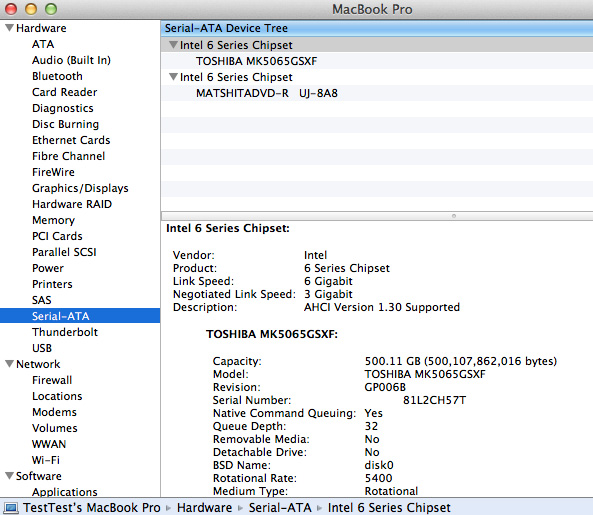
The good news is Apple's SSD pricing isn't horribly unreasonable, at least at the beginning. For $200 you can upgrade the 15-inch MacBook Pro to a 128GB drive (most likely a 3Gbps Samsung based SSD). It's when you look at the 256GB or larger drives that you're probably better off buying your own. You can buy a 256GB Crucial m4 for under $400 today, and a 240GB Vertex 3 will set you back around $460. Both options are cheaper (and faster) than Apple's $600 256GB upgrade. If you get the high-end 15-inch MBP model however, the upgrade prices drop by $100 - making the Apple route much more cost competitive. You don't get the same performance you would from an aftermarket drive, but with less headaches and potential for issues it's possibly a better route.
The 512GB drives are most definitely not a bargain from Apple. To equip a 15-inch MBP with a 512GB SSD, Apple wants $1200. You're much better off buying a 512GB Samsung SSD 830 for under $800 and pocketing the difference.
| Apple SSD Upgrade Pricing | |||||
| 128GB | 256GB | 512GB | |||
| 13-inch 2011 MacBook Pro | $200 | $600 | $1200 | ||
| 13-inch 2011 MacBook Pro (high end) | $100 | $500 | $1100 | ||
| 15-inch 2011 MacBook Pro | $200 | $600 | $1200 | ||
| 15-inch 2011 MacBook Pro (high end) | $100 | $500 | $1100 | ||
| 17-inch 2011 MacBook Pro | $100 | $500 | $1100 | ||
What aftermarket SSD should you buy? If you want to play it safe and hang on to TRIM support, go with Apple. Ever since I've been reviewed SSDs however I've run aftermarket SSDs in my Macs, mostly without any major issues. I can vouch for the Intel SSD 510, Samsung SSD 830 and OCZ Vertex 3. At one point or another I've used all of them in my 2011 MacBook Pro. My current setup is a Samsung 830 in the primary drive bay and an Intel SSD 510 in place of my optical drive, the combination works wonderfully.
Still Great WiFi
Apple continues to quietly focus on delivering excellent WiFi performance with the MacBook Pro. In the late 2011 models WiFi is still powered by Broadcom's BCM4331 3x3 solution. A quick test with a 3rd generation Time Capsule showed us peak transfer rates of 154Mbps, in line with what we've seen with the first generation Sandy Bridge MacBook Pro.

Despite Apple's move to Bluetooth 4.0 support on some of its other platforms, the MacBook Pro remains at 2.1 with the same BCM2070 controller.
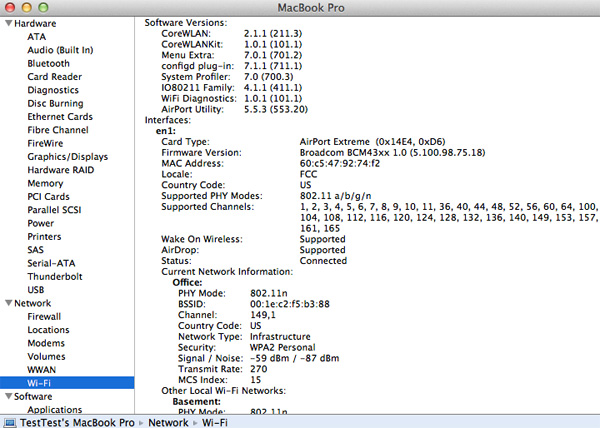


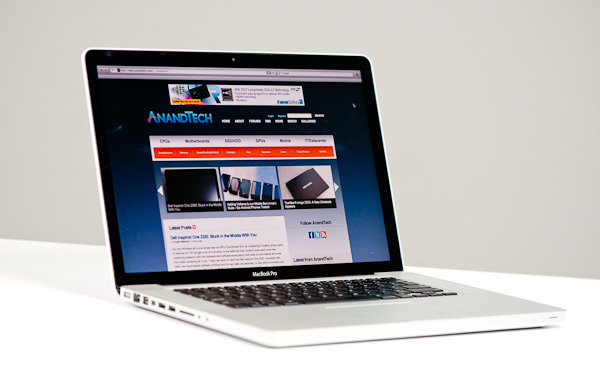








101 Comments
View All Comments
gradjoh - Thursday, November 17, 2011 - link
If I read the charts correctly, then the new "late 2011" model is slower in every category than the "early 2011" model??Zellias - Thursday, November 17, 2011 - link
Since when have mac users been focused on performance? If you're concerned about performance buy a PC and save yourself some time and money.KoolAidMan1 - Thursday, November 17, 2011 - link
High end MBPs have generally been on the high end of performance. Fanboys threw a shitfit a few years ago when PCMag rated the MBP as the fastest PC laptop, barely edging out an HP (I think it was an Elitebook).You're paying for that performance in a thin and light package with good battery life. Compromise on any of those as well as the display, the keyboard, and the trackpad, and it's easy to get a cheaper laptop from someone else.
arterius2 - Thursday, November 17, 2011 - link
Bug off iFanyboy, fastest PC laptop? you make me laugh, my 2 year old Asus G73 with an intel SSD rapes the living sh1t out of this POS. I been playing Starcraft II @ 1920x1080 on high setting with 40+fps with this laptop at less than half the price of the macbookpro.thin and light package? do you even know the crap you spew out of your mouth? macbook pro is far from light, in fact its quite heavy for its class due to being carved entirely out of a block of metal.
Flunk - Thursday, November 17, 2011 - link
Nice troll, missing the point entirely is the way to go!KoolAidMan1 - Thursday, November 17, 2011 - link
Wow, so mad!See, this is what I talk about when it comes to angry fanboys. Newsflash: these machines all have most of the same guts, a quad core i7 in my case.
And my POS MBP runs Starcraft 2 at over 60fps on high and over 200fps on low (pro style) at the same resolution.
As far as weight goes, 5.6 lbs is extremely light given that notebooks with the same display size and power are generally over 6lbs and generally around 8lbs.
GG
KoolAidMan1 - Thursday, November 17, 2011 - link
Also, there seem to be serious reading comprehension issues here. The PCMag example I gave was ONE example where the MBP (I believe it was the Penryn launch) was actually the fastest notebook for a time. Obviously it isn't always the fastest, thermal limitations and the chassis size are always going to place a limit on that.The point still seems to stand though, say that the 15" MBP is actually fast hardware, or sometimes even the fastest, and some people go ballistic.
JarredWalton - Friday, November 18, 2011 - link
The MBP has never been the fastest notebook around. Ever. It has (debatably) been one of the best built and equipped laptops, but fastest? Penryn MBPs were released around the time when other high-end laptops were going to Core 2 Extreme or at least T9500. The only way an MBP is "fastest" is if you arbitrarily eliminate faster contenders. Consider these two reviews (within a couple days of each other):Dell XPS M1730:
http://www.anandtech.com/show/2461
MBP 15 Penryn:
http://www.anandtech.com/show/2459
The XPS M1730 smokes the MBP 15 in performance (not that we did Apples to apples tests of the two, but you can just look at the specs to see where Apple is less than the XPS), thanks to the GPUs and faster CPU. Again, this is not to say that an MBP isn't potentially "best", or "best battery life", but "fastest"? Don't make me laugh.
KoolAidMan1 - Friday, November 18, 2011 - link
As I said, that was the result of a PCMag review that rounded up several other laptops in its comparison.As I also said in another response in this thread, it obviously wasn't the fastest forever, the whole point of that story is that people got up in arms over such a favorable review, just as it happens every time Anand posts a good review of an Apple product.
That is all.
I wouldn't dare call MBPs the fastest laptops around, if I wanted that I would be sacrificing battery life and size for the extra TDP that the faster CPU and GPU generate. This is obvious, but again it is an anecdote about the review used to make a point about how angry some people can get on the internet because some notebooks have a fruit shaped loge on the case.
JarredWalton - Friday, November 18, 2011 - link
PC Mag. 'nuf said. ;-)I get the same vibe when I read modern hardware reviews in PC Gamer magazine; it's like the companies are just paying for the reviews to be favorable. "Oh, it's an Alienware? 95% and Editor's Choice!" Okay, we like the M17x and M14x (and to a lesser extent the M11x R3), but the M18x just feels like too much. /tangent